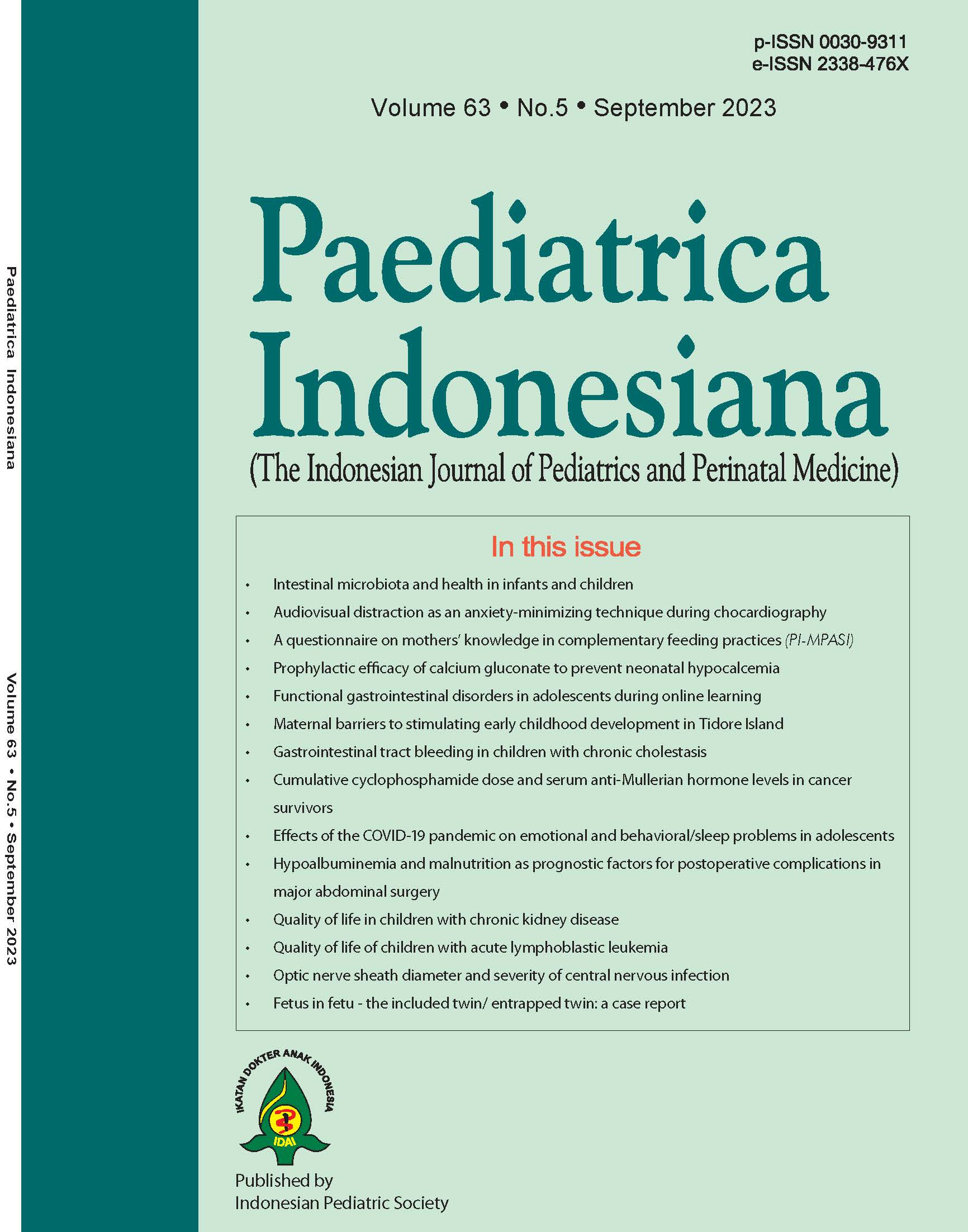Development, validity, and reliability of a questionnaire on mothers’ knowledge in complementary feeding practices (PI-MPASI) in Indonesia
Abstract
Background A number of complementary educational feeding modules have been circulating in the community, but mothers have yet to use them optimally. There is an urgent need for an effective educational method on appropriate complementary feeding and an instrument to measure maternal knowledge in proper complementary feeding practices.
Objective To develop and assess the validity and reliability of a questionnaire on complementary feeding practices.
Methods We conducted a qualitative study to develop a questionnaire followed by a cross-sectional study to test the validity and the reliability of the PI-MPASI questionnaire. The research team designed the PI-MPASI questionnaire through a literature review with a team of experts, based on the evidence-based feeding practice recommendations for infants and toddlers in Indonesia as compiled by the Indonesian Pediatric Society (IPS) in 2015. Content validation was carried out through expert review, whilst the construct validity and the reliability were tested on 110 mothers who met the inclusion criteria.
Results In the content validity assessment, an average congruent percentage of 90% was obtained for the sub-themes of time, nutritional adequacy, safety, and feeding responsiveness as the four essential points that mothers should know regarding proper complementary feeding practices. Most of the item scores showed moderate to high correlations with the total score, with reliability test showcasing a good internal consistency (Cronbach's alpha = 0.715).
Conclusion This study showed that our questionnaire on mothers’ knowledge in complementary feeding practices (PI-MPASI) is a valid and reliable instrument to assess maternal knowledge on correct complementary feeding practices in Indonesia.
References
2. Aboud FE, Akhter S. A cluster-randomized evaluation of a responsive stimulation and feeding intervention in Bangladesh. Pediatrics. 2011;127:1191-7. DOI: https://doi.org/10.1542/peds.2010-2160.
3. Waber DP, Bryce CP, Fitzmaurice GM, Zichlin ML, McGaughy J, Girard JM, Bernie Endyarni Medise et al.: Effects of the COVID-19 pandemic on emotional and behavioral problems and sleep problems
in adolescents
. Neuropsychological outcomes at midlife following moderate to severe malnutrition in infancy. Neuropsychology. 2014;28:530-40. DOI: https://doi.org/10.1037/neu0000058.
4. Blaney S, Februhartanty J, Sukotjo S. Feeding practices among Indonesian children above six months of age: a literature review on their magnitude and quality (part 1). Asia Pac J Clin Nutr. 2015;24:16-27. DOI: https://doi.org/10.6133/apjcn.2015.24.1.13.
5. Blaney S, Februhartanty J, Sukotjo S. Feeding practices among Indonesian children above six months of age: a literature review on their potential determinants (part 2). Asia Pac J Clin Nutr. 2015;24:28-37. DOI: https://doi.org/10.6133/apjcn.2015.24.1.14. PMID: 25740739.
6. Santika O, Februhartanty J, Ariawan I. Feeding practices of young children aged 12–23 months in different socio-economic settings: a study from an urban area of Indonesia. Br J Nutr. 2016;116 Suppl 1:S1-7. DOI: https://doi.org/10.1017/S0007114515003438.
7. Fahmida U, Kolopaking R, Santika O, Sriani S, Umar J, Htet MK, et al. Effectiveness in improving knowledge, practices, and intakes of "key problem nutrients" of a complementary feeding intervention developed by using linear programming: experience in Lombok, Indonesia. Am J Clin Nutr. 2015;101:455-61. DOI: https://doi.org/10.3945/ajcn.114.087775.
8. Rakhmawati NZ, Panunggal B. Hubungan pengetahuan dan sikap ibu dengan perilaku pemberian makanan anak usia 12-24 bulan. J of Nutr Col. 2014;3:43-50. DOI: https://doi.org/10.14710/jnc.v3i1.4527
9. Kementerian Kesehatan Republik Indonesia. Buku Kesehatan Ibu dan Anak. Jakarta: Kemenkes RI dan JICA; 2016.
10. Wijhati E, Suryantoro P, Rokhanawati D. Optimalisasi peran kader dalam pemanfaatan buku KIA di Puskesmas Tegalrejo Kota Yogyakarta. Jurnal Kebidanan. 2017;6:112-9. DOI: https://doi.org/10.26714/jk.6.2.2017.112-119.
11. UKK Nutrisi dan Penyakit Metabolik Ikatan Dokter Anak Indonesia. Rekomendasi praktik pemberian makan berbasis bukti pada bayi dan batita di indonesia untuk mencegah malnutrisi. [cited 2022 May 15]. Jakarta: Badan Penerbit IDAI; 2015. Available from: https://www.idai.or.id/professional-resources/pedoman-konsensus/rekomendasi-praktik-pemberian-makan-berbasis-bukti-pada-bayi-dan-batita-di-indonesia-untuk-mencegah-malnutrisi.
12. Hendryadi H. Validitas isi: tahap awal pengembangan kuesioner. J Ris Manaj dan Bisnis Fak Ekon UNIAT. 2017;30:169-78. DOI: https://doi.org/ 10.36226/jrmb.v2i2.47.
13. Kaligis F, Ismail RI, Wiguna T, Prasetyo S, Indriatmi W, Gunardi H, et al. Translation, validity, and reliability of mental health literacy and help-seeking behavior questionnaires in Indonesia. Front Psychiatry. 2022;12:764666. DOI: https://doi.org/10.3389/fpsyt.2021.764666.
14. Michaelsen KF, Weaver L, Branca F, Robertso A. Feeding and nutrition of infants and young children: guidelines for the WHO European Region, with emphasis on the former Soviet countries. [cited 2022 May 10]. Available from https://apps.who.int/iris/handle/10665/272658. p.288.
15. Abeshu MA, Lelisa A, Geleta B. Complementary feeding: review of recommendations, feeding practices, and adequacy of homemade complementary food preparations in developing countries - lessons from Ethiopia. Front Nutr. 2016;3:1-41. DOI: https://doi.org/10.3389/fnut.2016.00041.
16. Boynton PM, Greenhalgh T. Selecting, designing, and developing your questionnaire. BMJ. 2004;328:1312-5.
17. Dancet EA, Ameye L, Sermeus W, Welkenhuysen M, Nelen WL, Tully L, et al. The ENDOCARE questionnaire (ECQ): a valid and reliable instrument to measure the patient-centeredness of endometriosis care in Europe. Hum Reprod. 2011;26:2988-9. Dancet EA, DOI: https://doi.org/10.1093/humrep/der277.
18. Tsang S, Royse CF, Terkawi AS. Guidelines for developing, translating, and validating a questionnaire in perioperative and pain medicine. Saudi J Anaesth. 2017;11Suppl 1:S80-S89. DOI: https://doi.org/10.4103/sja.SJA_203_17.
19. Boateng GO, Neilands TB, Frongillo EA, Melgar-Quiñonez HR, Young SL. Best practices for developing and validating scales for health, social, and behavioral research: a primer. Front Public Health. 2018;6:149. DOI: https://doi.org/10.3389/fpubh.2018.00149.
Copyright (c) 2023 Rini Andriani, Bambang Supriyatno, Aria Kekalih, Damayanti Rusli Sjarif

This work is licensed under a Creative Commons Attribution-NonCommercial-ShareAlike 4.0 International License.
Authors who publish with this journal agree to the following terms:
Authors retain copyright and grant the journal right of first publication with the work simultaneously licensed under a Creative Commons Attribution License that allows others to share the work with an acknowledgement of the work's authorship and initial publication in this journal.
Authors are able to enter into separate, additional contractual arrangements for the non-exclusive distribution of the journal's published version of the work (e.g., post it to an institutional repository or publish it in a book), with an acknowledgement of its initial publication in this journal.

This work is licensed under a Creative Commons Attribution-NonCommercial-ShareAlike 4.0 International License.
Accepted 2023-10-30
Published 2023-10-30











